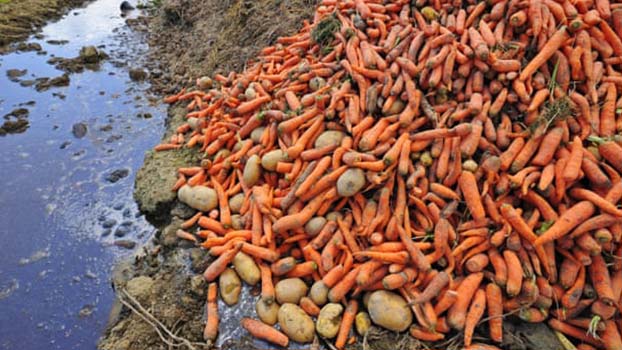Food waste management

Worldwide, food waste is one of the prime issues threatening food security and Bangladesh is not an exception. Our street and garbage bins, landfills have sufficient evidences to prove it. A recent study revealed that the trend of wasting food is increasing in the country and the surplus food that is wasted at wedding programmes in the capital is the highest among total food wastage. Also a huge amount of food gets wasted at restaurants and hotels though the awareness around this has grown in the last five years.
Food waste refers to food that is good in quality and fit for human consumption but that does not get consumed because it is discarded for many reasons. Even though the world produces enough food to feed twice the world’s present population, the irony is that still there are billions of people who are malnourished. According to UN, if the amount of food wasted around the world were reduced by just 25% there would be enough food to feed all the people who are malnourished
Food and food waste has been an emerging global problem for the past few years. The very extent of food losses and waste invites to consider them not as an accident but as an integral part of food systems. Food losses and waste are consequences of the way food systems function, technically, culturally and economically.
With accelerated economic growth and increasing production, food waste will be a matter of grave concern also in Bangladesh sooner or later. Bangladesh, being the ninth most populous and twelfth most densely populated country in the world will surely bear consequences of both food scarcity as well as food loss if food wastage problem is not addressed.
Reportedly, people in Bangladesh wastes about 5.5% of the total procured food. Of the total wastage, 3% is being made during procurement and preparation stage, 1.4% during serving, and another 1.1% from the plates. It is envisaged that because of being one of the most densely and highly populated countries in the world, will surely face food scarcity if the problem of wastage is not addressed
Though Bangladesh produces enough food to meet the needs of its entire population, yet it is unable to provide nourishment to starving women and children due to criminal wastefulness. In recent years, numerous initiatives and interventions have been undertaken by the Government and local and international actors to target food loss and wastage across the agricultural value chain. The Government is seeking to streamline and modernise agricultural value chains to reduce the waste associated with the distribution and storage of grain.
Food losses and waste impact both food security and nutrition and the sustainability of food systems, in their capacity to ensure good quality and adequate food for this generation and future generations. It calls for all stakeholders – states, international organizations, private sector and civil society – to recognize food security and nutrition as a central dimension of sustainable food systems.
Bangladesh needs to find ways to utilize the surplus food left by ordinary citizens to reduce the food waste stream. Though it is impossible to completely halt the food waste issue yet can be minimized significantly by creating public awareness through launching a sound campaign and the vibrant extension education programs on food waste. Reducing waste demands a change at both the personal attitudes and commercial viewpoints.
Also Bangladesh should launch a national, comprehensive campaign with the goal to save food and use it wisely since a significant proportion of food is imported. In Bangladesh, a campaign needs to be launched to stop the wasting of food, not simply in the family, but in restaurants, hotels, schools, institutions, and universities.
Bangladesh needs to mobilise large-scale investments in cold storage methods, refrigerated transport and other modern logistics to modernise its food supply chain. We need to invest in infrastructure and public goods to reduce food waste and to ensure sustainable food systems such as storage and processing facilities, reliable energy supply, transport, appropriate technologies, improved access and connection of food producers and consumers to markets.
Also the country needs to implement an adequate framework including regulation, incentives and facilitation so that the private sector (e.g. wholesaler, retailer, catering and other food services) and consumers take robust measures to tackle unsustainable consumption patterns. This framework should also ensure that the private sector better incorporates negative externalities of their activities such as damage to natural resources. We should create an enabling environment for the reduction of food waste by encouraging sustainable patterns of consumption among the population, as well as food and non-food investments promoting food security. We believe cutting food waste and distributing the world’s surplus food where it is needed could help tackle hunger in places that do not have enough - especially given that land to expand farming is limited.
It is said that reducing food waste around the world would help curb emissions of planet-warming gases, lessening some of the impacts of climate change such as more extreme weather and rising seas. Avoiding food loss and waste would therefore avoid unnecessary greenhouse gas emissions and help mitigate climate change. Sayeed Hossain Shuvro is Editorial Assistant, Bangladesh Post



